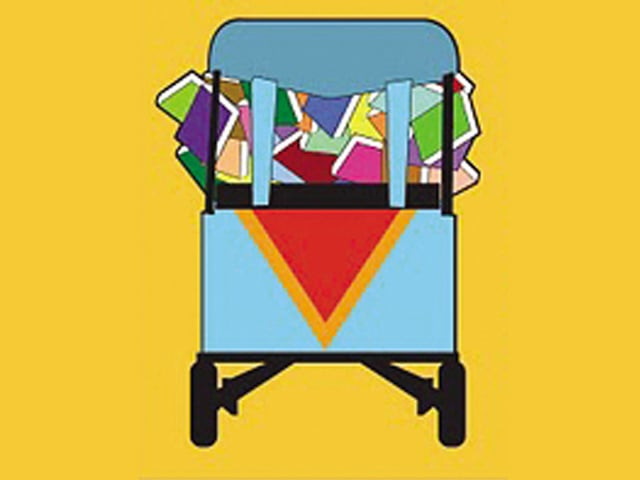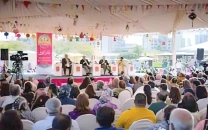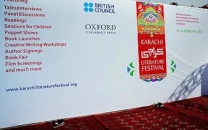Karachi Literature Festival: Reading – the door to many lives
Panellists discuss issues ranging from the death of reading to govt policies to aid publishing.

"Should we be looking at per capita income?" asked Ghazi Salahuddin who had earlier posed the question as well. "Or perhaps we might look at the human index?”
Finally Salahuddin suggested that "above all the possible tools of measurement one needs to see whether a nation reads. An important tool one needs to look at is the per capita consumption of news print." Noting that Pakistan was "very low" on this chart, Salahuddin compared the country to its regional neighbours, China and India, where newspaper circulation rose by six per cent.
In terms of circulation Pakistan might just compare with Delhi. "This situation is quite dismal. English is still considered a language of the elite while the nation at large is still unable to agree on a national language," he said.
Citing the example of Brazil, Salahuddin said that poverty levels have drastically declined in the South American country he recently visited. "I saw small book stalls every few blocks in Rio and Sao Paulo," he said adding that most books available were on literature, poetry among other genres translated in Portuguese. "I was ashamed that we are so far behind (in this regard) of a country which we know as a 'third world'."
How then will we learn, open our minds, grow, understand and enlighten ourselves if do not read, Salahuddin argued. "Any activity which expands our minds, thoughts and perceptions is through reading even quality cinema. We need to be able to give ourselves a chance to explore ourselves through books and films," he urged.
Next to speak on the "de-intellectualisation of the population" was renowned educationist Anita Ghulam Ali, whose presence summons instant respect. She conducted most of her speech in English apologising for her relatively weaker command over Urdu.
She countered Salahuddin's arguments from three angles. First, she pointed out, print media (including books) were now competing with television and cinemas and "one needs to look at the issue from within that dimension as well." Perhaps some prefer the visual medium over the written word and that may be their source of intellect.
Second, in her opinion, "the reading habit is certainly not dead," however, she balanced her arguments by adding that priorities have been skewed to a certain extent. "You see roads lined with Prados while the government of Sindh announces the closure of 1,000 schools. These are our priorities," she said.
Third, speaking on government policies to aid the publishing industry, Ali suggested that the issue of recycling of paper needs to be taken up seriously. She also proposed subsidies on paper that would be utilised for printing children's education books which would result in lowering the overall price.
Remembering her childhood, Ali said, parents play a vital role in developing a child's reading habits. "I am not referring to the bedtime stories," Ali pointed out, "I am speaking about reading in general, sitting and reading and discussing with your children, making good books available to them and nurturing their areas of interest."
Another educationist on the panel was Arfa Sayeda Zehra who held strong views on subject. "I do not wish to live in a masculine world and I do not wish to live in a feminine world. I yearn to live in a human world," she began, adding that “whether the Book came from the skies or was one written and compiled on earth," a person needed the "written word" to learn how to lead life. In response to Ali’s claim that reading was not dead, Zehra said, "When we say dead we do not wait for everyone to die. The death of the majority is enough."
Engaging the audience with her tongue-in-cheek manner of speech and impressive command over the Urdu language, Zehra flowed from one aspect of the topic to another supporting her arguments with relative ease and simple analogies.
Speaking on the changes brought about by whom she sarcastically called her "mehboob (beloved) Ziaul Haq" Zehra said the general managed to strip away some key elements of learning from society. "The taqreer (speech of learning) was taken away and the khutba (religious preaching) was left," she said adding that “fatwas” which were as result of conducting only khutbas are not a process of learning but regression.
"You reduce the importance of a teacher and then you remove a book from the equation and all you have left are preachers and those are easier to manipulate," she said. Learning brings evolution and a sense of ethics, Zehra argued adding that "a nation without character was pointless." Saying the onus of improving ourselves was not the sole responsibility of the government Zehra urged people to step up. "The government is barely able to meet its constitutional obligations let's just leave out its moral ones."
Speaking on the expense of books, she gave a comparative example of a group of four people ordering a pizza which cost Rs1,000 while buying a single book which many could read only cost Rs500. The pizza will be forgotten the next day, she said, but what you learnt from reading will stay with you for some time to come. "A book is a mirror," she claimed, "It can show you what was, what is, what can be and what could have been."
Managing director of the Oxford University Press Ameena Saiyid said that while people were reading and interested in buying, books available today are more relevant to them than they were 30 years ago. "It is important to publish books people need and want to read and to do so at affordable prices."
Agreeing with Ghulam Ali on the role of parents nurturing their child, Saiyid admitted that she learnt English properly at the age of nine through reading books.
A key issue that was addressed in the question and answer session which followed was the unavailability of important books on geo-politics, autobiographies, analysis etc in Urdu. Most religious books were the one available in English, a member from the audience observed. Zehra responded by saying that there was a need to gain confidence in Urdu and that books which were available in English must also be made available in Urdu.
Also on the panel, Mass Communication student Attiya Abbas spoke briefly yet to the point on the role a school plays in developing and nurturing students to read through various incentives and programmes. Quoting SI Hayakawa, she concluded by saying, "It is not true that we have only one life to live; if we can read, we can live as many more lives and as many kinds of lives as we wish."



















COMMENTS
Comments are moderated and generally will be posted if they are on-topic and not abusive.
For more information, please see our Comments FAQ